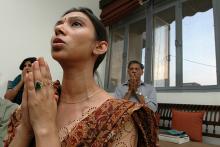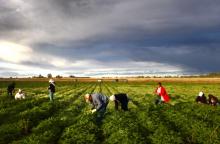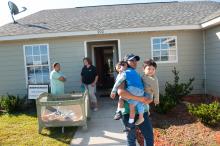immigrants

When I go out with my Dad, he often wears a cap identifying him as a Korean War veteran. Over and over again, people tell him, “Thank you for serving.” Over and over again.
I’m always struck by the contrast between that appreciation and the sad, hidden truth about our country’s treatment of some other veterans. I’m speaking of the government’s detention and deportation of many immigrants who served in our armed forces but who are not yet citizens.
The first time I heard about this was 1998. My friend’s husband, a Canadian who grew up in Texas and chose to serve in Vietnam had recently gotten a deportation order based on some old drug charges, the kind of thing many vets experienced. What horrified me then, and still does today, is that immigration judges could not grant an exception. Nothing could stop the deportation except a change in U.S. immigration laws.
We all know the conversation on immigration in the United States can oftentimes become contentious, with inaccurate portrayals of immigrants inhibiting progress. The most recent attempt to fuel the debate with fear-driven messaging is by NumbersUSA.
A new ad by the organization tries to pit racial groups against each other by suggesting that immigrants admitted to the country on work permits are “stealing” jobs from other racial minorities.
This tactic is hateful, fear-based, and sad. By running this ad NumbersUSA is trying to divide people against each other on racial grounds, sowing hate and division among our neighbors. It misrepresents the truth about immigrant workers and the benefits they provide to our country. It also does nothing to substantively address the issue of unemployment among minorities, a problem we can’t solve by directing hate at one segment of the population.

IT WOULD BE strange if any segment of the liturgical year left out the theme of migration. The Bible is riddled from end to end with the journeys of nomads, pilgrims, exiles, returning exiles, and the risky intrusions of strangers across boundaries erected to deter them.
This season’s poster child for divinely inspired mobility is the lovely figure of the Moabite “alien” Ruth, who chooses to leave her own country and accompany her beloved Jewish mother-in-law when she returns as a widow to her native Judea. Ruth’s story is romantic, even erotic, as she daringly slips into the arms of Boaz during the sexually charged siesta at the threshing floor. But our readings are no mere novelette. Scripture shows how much hinged on her pluck and her allure. Her great-grandson will be David, and her descendant Jesus the Messiah!
“Where would we be without immigrants?” is one of the many questions between the lines of the scriptures. The Bible has lots to say to us about the divine impulse active in migrations, and the opening of the heart to “strangers within our gates”—things guaranteed to alarm defensive nationalists of every stripe.
I remember the deep spiritual emotion that caught us all up in Boston’s Faneuil Hall during my naturalization ceremony—Cambodian refugees, Vietnamese grandmothers, Salvadoran families, and all the rest of us. I think of the migration of my own great-grandparents to Russia, and the adventures that have scattered my own family from New Zealand to Mexico. How God revels in mixing us all up!

Congress is due to recess soon, but members are trying to pass a bill attempting to increase the availability of high-skilled visas for the tech industry before adjourning at the end of this week. While different versions of the legislation exist, the fundamental goal is to allocate more visas to foreign-born graduates of U.S. universities who have obtained a master’s or doctorate degrees in science, math, technology or engineering (STEM) fields.
After four years of living in the U.S., Mohamed Jedeh is anxious to return to his native Libya.
It irks him that his local mosque in Union City, N.J., won’t broadcast the Muslim call to prayer for fear of angering neighbors, yet nobody complains about the noise from a local bar. Back home, there are no scantily clad women walking across his sight line, and fasting during the holy month of Ramadan is easier because almost everyone is doing it.
Jedeh would probably be home by now if he hadn't been asked by a mosque in Boston to help with special nightly Ramadan prayers. After graduating in May with a master's degree in clinical research from the New York University College of Dentistry, he's ready to get back to the small city of Zintan in northwest Libya, where he plans to teach dentistry and work at a local clinic.
“It’s different,” said Jedeh, who flies back on Aug. 20. “I miss the Islamic atmosphere.”
Despite his homesickness, Jedeh said he has had a positive experience in the U.S. He initially worried about his wife's safety because she wears a niqab, or face veil, but except for one insult shouted by a passerby, he and his family have been treated respectfully.
“I believe you cannot judge any country and say, all people are good or all people are bad,” said Jedeh.

When I was a sophomore at Bethel University, I was the top 1,500-meter runner on my track team. Then, my junior year, a transfer student came, and she was really fast. She quickly took my place as the fastest miler on the team, winning multiple national championships in the process.
I’ll admit to having felt a little bit frustrated because she came in from the outside and passed me up. But training with her is one of the key reasons I was ultimately able to finish sixth at the national meet, good enough to earn All-American honors.
She pushed me to become better. She gave me someone to chase. She brought more attention to our school and our team, resulting in more fast recruits. In short, she made me and our whole team better.
As the London Olympics begin this week, the United States counts many “transfers” — immigrants from all over the world who are now U.S. citizens — among its top athletes. Some people may feel threatened by these immigrants because they are potentially taking the place of others who were born here.
But I think our immigrants make us better, just like my transfer teammate made me better. They continually push us to do better, work harder and find new ways to improve.
Jonathan Wilson-Hartgrove and Isaac S. Villegas are friends and fellow kingdom-bringers in Durham, North Carolina. Since publishing The Wisdom of Stability in 2010, Jonathan has been calling Christians to put down roots and pay attention to place for the sake of God’s reign. Isaac has gently challenged him to recognize the dangers of stability and the way immigrants or marginalized members of a community are often excluded by those who “own their place.” They offer their conversation as an invitation to discern with them a theology of place for our time.
Isaac S. Villegas: I was working alongside a little girl in our congregation’s community garden at the women’s shelter in Chapel Hill. As we were digging, she looked up at me and said that her mom warned her to beware of lice when playing outside. I reassured her that I hadn’t seen any lice around, but I asked her if she knew what to look out for. “Yes,” she said. “My mom told me to watch out for Mexicans because they bring lice.” I looked down at my hands, wondering if my hue revealed that I’m from lands further south than Mexico. Will this child grow up to think that people like me don’t belong in the South, that we are social contaminants, that our cultures dirty the body politic, that we spread lice?
These are the questions that linger in my mind when I hear my friend Jonathan argue for a recovery of “the wisdom of stability” in the Christian community. In this land where both Jonathan and I live, I’m uneasy when I hear “stability” because I see how such rhetoric belongs to a particular Southern tradition. I am the foreigner, of questionable lineage, that the people who’ve been here longer can reject or accept—reject because they think that I’m a threat to the stability of the community, or accept because they think I will contribute to a sustainable future. In either case, the assumption is that they are the ones entrusted with the land and culture. Arguments about stability have fueled people’s claims to own or steward the land and their assumption that they are the gatekeepers of society, deciding who belongs where.
“I hope to reprogram your default setting,” Jonathan writes in his book. “Our default is to move.” Instead of movement, he points to the witness of trees, which serves as the book’s focal image: “Trees can be transplanted ... But their default is to stay.” I worry that to celebrate stability as the solution to movement renders recent immigrants as defective Christians—wild, unruly, in need of reprogramming.
Movement is my default setting: It’s in my immigrant blood; it’s the story of my family. While the wisdom of stability privileges the parts of the Bible that call us to permanency, I find good news in the biblical stories of wandering, exodus, relocation, and mission. These stories resonate with the lives of migrants—people who are not trees, but birds: always building and abandoning nests as they follow the seasons.
Jonathan Wilson-Hartgrove: Every writer needs friends who remind them that words can be dangerous. I’m grateful for Isaac, who keeps me thinking hard about what I’m saying and why.
Shortly after The Wisdom of Stability was published, I got a call from the director of a mission agency who’d read the book. He asked if I’d come and speak to the global gathering of the group’s staff. I’d love to, I told him, but wondered why they thought a word on stability was needed. “Well, we have a problem in missions,” he said. “We keep sending people who’ve never belonged anywhere. They don’t seem to have much capacity to connect with the places where we send them.”

Who is a refugee in our world today? How does one receive “refugee protection” and is this determination fair and just? On World Refugee Day 2012, June 20, we remember those who have fled persecution because of their ethnicity or country of origin, religion or political views.
These atrocities are serious and asylum an appropriate response. The UNHCR reports that 800,000 people became refugees in 2011, while a total of 4.3 million people became newly displaced (mostly hosted in Africa and the Middle East).

LOS ANGELES -- Even though she met her husband through an arranged marriage, Pooja Sindhwani considers herself a modern woman. She worked in interior design in her native India for four years, and she and her husband spent a year getting to know each other before their wedding. When she followed her husband to Houston, she wasn't worried about adjusting to life in the United States.
"You feel you're going to a country that offers opportunities," Sindhwani said, "you expect that things will work out."
Except when they don't.
Unable to land a job in Houston, Sindhwani slipped into depression. Like thousands of Indian women, she was issued an H-4 "dependent spouse" visa that did not allow her to work.
Sindhwani's husband was a highly skilled foreign worker, sponsored by a U.S. company on an H-1B visa. The Indian women who marry highly skilled workers also tend to be well-educated professionals. Many think it will be easy to transfer from a dependent spouse visa to a work visa.
The constant rejections from companies that couldn't sponsor her work visa took a toll on Sindhwani.
Food-related coverage in this issue was supported by ELCA World Hunger (www.elca.org/hunger)
“Lord, you are good to all and compassionate toward all you’ve made ... You are faithful in all your words, and gracious in all your deeds. The eyes of all look to you in hope, and you give them their food in due season” (Psalm 145:9, 13, 15).
I often reflect on this message from Psalm 145 and how each of us will interpret it differently according to the experiences we’ve had in life. This is true even for the things in life that connect and affect us all.
Take, for example, God’s gift of food. We are interconnected by this thing that was created to nourish our bodies and minds, allowing us to function in our daily lives and permitting us to live a full and healthy life. Yet how often do we think about where the food we eat comes from?
When I’m at the store, I often wonder whose hands cultivated and cared for the plants that produced the piles of neatly stacked fruit and vegetables. Was it a Lupe, a Daniel, or a Jesus? How long did they have to work under the blazing hot sun in order to get the produce to the store? What are their stories and where do they come from?
I think about these things because I grew up with people who worked long, hard hours to produce the best quality of fruit for the market. Since I was very young, my immediate family has been immersed in agricultural work. My mother was a farm worker who picked fruit and vegetables. Once we children were old enough, we joined my mom and the rest of the labor force, which was mainly comprised of immigrant farm laborers. In the 19 years I’ve been around this work, rarely have I seen a non-immigrant hand in the orchards, and if I did, it surely wasn’t to help pick the fruit in bags that weigh up to 45 pounds.
“Question people who have authority, because they tend not to use it well unless you stay on top of them.”
That’s what Ana Garcia-Ashley learned from her grandmother, a seamstress and a teacher in the campo of the Dominican Republic. She was a woman who taught by example, challenging anybody in her small village who misused power. “She would not tolerate anything,” remembers Ana. “She took on whomever—even priests.”
And you can say the same about Ana.
Throughout more than 30 years of community organizing, Ana has put her Catholic faith into action by holding people in power accountable: standing in protest at state capitols, stopping predatory lenders, and blocking deportation trucks by laying her body in the road. “To me there is only one way to be a Catholic,” she says, “and that is out in the public arena, doing something.”
In 2011, Ana became the executive director of Gamaliel, a national network for faith-based community organizing. As “congregational” or faith-based organizers, Gamaliel emphasizes systemic change: engaging congregations in the work of feeding the hungry, caring for the sick, and sheltering the homeless, but also in the work of transforming the oppressive systems that leave so many people without food, health insurance, or homes in the first place.
Ana also is the first woman of color to lead a national community organizing network, faith-based or otherwise.
“I am emboldened and encouraged that leadership in the field has become more representative of our grassroots leaders and organizers,” wrote Ana during her first year as executive director.

About every five years the Farm Bill addresses a broad set of food and agricultural policy issues. Commodity price supports, farm credit, trade, agricultural conservation, research, rural development, energy, and foreign and domestic food programs were just some of the issues included in the Food, Conservation, and Energy Act of 2008, as the last Farm Bill legislation was officially titled.
The Farm Bill is also known for the broad range of policy stakeholders who work on it, including state organizations, national farm groups, commodity associations, conservation advocates, rural development organizations, and faith-based groups.
But even with its inclusive set of policy issues and actors, the Farm Bill is notable for one issue policymakers and advocates doesn’t touch: People who work on farms.

Whenever possible, I plan my Saturday errands such that I’ll be able catch part of “This American Life” on public radio as I drive and I’ve often found myself sitting in the grocery store parking lot to hear the end of a story.
One recent Saturday, the show’s theme — which ties together each of its non-fiction stories — was the biblical truism that “you reap what you sow” (Galatians 6:7), and most of the program was dedicated to examining the consequences — intended and otherwise — of Alabama’s controversial, toughest-in-the-nation immigration law, HB 56, which passed last June.
Whether what is happening in Alabama as a result of this law — and, as the program reveals, a great deal is happening, even if most of us outside of the state aren’t paying attention — was the intention of the bill’s authors and supporters is not entirely clear. What is clear, from a Christian perspective, is that the effects are devastating.
What most saddened me in the program was the statement of a young undocumented woman named Gabriella that, since the passage of HB 56, she finds herself unwelcome everywhere. “Even in the church,” she says, “you find people that… don't want to talk at you. And they don't want to give the peace to you.”
In 1884, Romney’s great-grandfather, Miles Parker Romney, fled to Mexico from Utah. Miles Parker Romney was a practicing polygamist and he wanted to protect his family from persecution. Mitt Romney’s father was born in Mexico, his family returned to the United States and took up residence in Michigan.
While Romney wouldn’t agree with his ancestor’s practice of polygamy, I am sure he understands his great-grandfather’s desire to do what he thought best for his family. Luckily for Miles Parker Romney, there was a country that allowed his family to settle and try and find a better life.
What is unfortunate is that candidate Romney doesn't seem to have that same kind of empathy for families today who are also in difficult positions.
Every 100 immigrants with advanced degrees who worked in STEM (science, technology, engineering and mathematics) fields created an additional 262 jobs for U.S. natives according to Zavodny’s research. The numbers increased even more when those immigrants had degrees from U.S. schools.

I noticed this Christmas season, for the first time, that not only were Mary and Joseph forced to migrate under Rome’s census; not only was the Incarnate God born into a humiliating space — but, as they fled to Egypt, they never registered in Bethlehem with the census. A dream, an angel, told the migrant father to gather his family and run from the authorities. Unaccounted for in the empire, baby Jesus’ first movement in this world was a government-evading trek through the desert by night.
I think about this as, right now, my friend Estuardo is probably crouching in the dark somewhere in the desert along the Mexican border. At the same time my wife and I hang electric Christmas lights on our tree, get out our nativity sets, and read familiar illustrated books about the stars in the sky above the shepherds. Estuardo has told me, from previous voyages across the border by night, how clear the stars are when hiding from the border patrol lights.
People of faith -- including evangelical Christians -- will be voting both ways in the upcoming election. It is simply not true that they will be voting only on one or two issues.
And, if evangelicals focus on many of the issues central to their faith, rather than becoming partisan cheerleaders, they might be able to raise some critical issues in this election and to hold both sides more accountable, even in a campaign that both Richard and I suspect will be one of the ugliest in U.S. history.
At the end of the evening, Amy remarked that if the upcoming election debates were as civil and substantive as this evening was, we would all be very grateful.
FoxNews shuns pro-immigrant voices. How do we repair souls returning from the war? Does Christianity translate into public policy? Lobbyists role in 2012 fundraising. Oakland mayor promises "minimal police presence" at OWS protests. Cain says he doesn't need to know foreign policy details. And only 40 percent of Americans correctly identify Romney as Mormon.
Baby steppin': Economy grew 2.5 percent in the third quarter. Democrats first offer: $3 trillion for debt. Immigration is a faith issue. Harsh rhetoric to derail the GOP? The canon of St. Paul's Cathedral in London resigns over plans to evict Occupy London protesters. Elizabeth Warren and the #OccupyWallStreet election test.
One little known fact about Houston is that it was the only major city in the South to integrate nonviolently. A meeting was held in a downtown hotel with key African-American leaders -- preachers, business owners, barbers, undertakers -- and the business and political power players from Houston's white establishment. The meeting determined that Houston would integrate silently and sit-ins would end -- no newspaper articles, no television cameras. They were simply going to change the rules of the game; and they did without any violence. It was a meeting that represented how Houston politics happen: provide a room, bring together community leaders, business interests and politicians, and get a deal done. Such meetings certainly make for strange gatherings, but at critical junctures in our city's history this mixture has proven to be a winning cocktail.